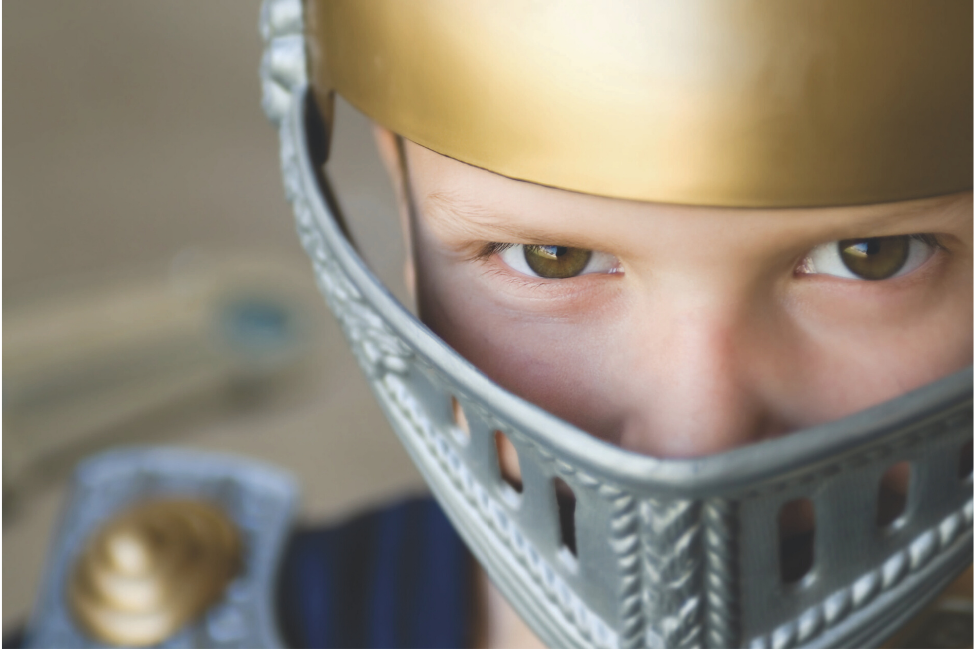Your Parenting Perspective Matters
Netflix, my friends, is an unsettling mirror.
Open the App. Like, right now. Take a leisurely scroll down the virtual buffet of TV shows and movies strategically curated to engage the majority of their customers… including you.
Seeing any patterns? Do they trouble you?
Now think of your innocent young son or daughter swiping into this stuff on their iPad. In their room. Alone. See their eyes widening, their pulse quickening, their hearts darkening. And that’s just Netflix.
Today’s media serves up such a pervasive hot mess of mythological, occult, sexual, and New Age psychobabble that we as parents can never truly say to our children, “When I was your age…” because as Chuck Beckler once said, “We were never their age.”
I grew up with the Smurfs and MacGyver. Now we’re dealing with Riverdale, Sabrina, Lucifer, Supernatural, Ghost Hunters, American Gods, Black Mirror, and Haunted — never mind the countless ‘safer’ programs laced with subtler anti-Christian forms of spirituality.
How should Christian parents navigate this minefield? Not with fear, that’s for sure. Fear often becomes a futile quest to preserve our children’s innocence by creating a Christian bubble for them to grow up in. This is what I call a protectionist mindset. The problem is, we can’t actually protect our kids from evil—at least, not forever. Evil is really good at enticing our children’s God-given curiosity, and we can’t always be there to keep them from sneaking a peek into Pandora’s Box when we’re not looking.
When my kids were younger, we tried to draw healthy boundaries around what kinds of movies they watched. During the ‘sleepover stage,’ when they spent Friday nights binging Root Beer and Cheesies in front of their friends’ flickering widescreens, the rule was simple: “If you haven’t seen the movie your friends want to watch, call us to ask.”
Which is all fine and good, but kids don’t always listen. One night our son Noah, probably eight or nine at the time, decided to watch Brothers Grimm (a horroresque popcorn flick inspired by Grimm’s fairy tales) at a sleepover without asking for permission. The following night as I tucked him in, he didn’t want me to leave. Eyes bugging out of his skull, he confessed his transgression with tears and manic pleading for prayer. I remember thinking with a smirk, “That’ll teach him,” — and then prayed half-heartedly for him to feel better.
All this reminds me of a fantastic scene in a late- nineties sci-fi flick called Soldier. The iconic Kurt Russel plays a genetically modified marine stranded with a colony of peaceful wayfarers on a wind-ravaged mining planet. Russel’s decommissioned man of blood and metal is ‘adopted’ by one of the families and their tender little boy in particular.
At one point, a viperous snake slithers into the family living quarters. Instead of killing the snake himself, the Soldier shows the little boy how to vanquish the deadly intruder using a boot as a blunt-force weapon. The child’s parents are horrified and furious that he would expose their son to such danger at an early age. Later in the story, however, another serpent slithers towards mom and dad as they sleep. Now empowered to handle this poisonous enemy, the little guy crushes the snake’s head with the boot and saves his incredulous parents’ lives.
Protecting our kids is a significant part of our parenting role early on, but this can never become our ultimate goal. As believers in Jesus, we’re trying to raise hope-hearted, faith-filled, love-gushing, world-changing sons and daughters of God. We want our children’s identities to grow from Jesus and who they are in him, not from the sin and evil they’ve been taught to avoid and fear. We’re not trying to prevent our kids from being changed by the world, we’re preparing our kids to change the world in Jesus’ name.
What this means is that over time, our parental protection should be replaced by their personal empowerment. As Hebrews 5:12-14 says, “Though by this time you ought to be teachers, you need someone to teach you the elementary truths of God’s word all over again. You need milk, not solid food… But solid food is for the mature, who by constant use have trained themselves to distinguish good from evil.”
The best way to protect our kids from evil is to ditch our protectionist mindset for an empowerment mindset that teaches them to discern evil and overcome it. They’ll never mature in their faith until they can do this for themselves. Here are four ways an empowerment mindset can inform our parenting.
PROGRESSIVE EDUCATION
We’re obviously not going to sit a four-year-old down and say, “Look kid, demons are everywhere, all around us in the shadows, and they want to kill us by coming through the TV. But trust God and you’ll be okay. Good night and good luck.”
With toddlers, you might start by establishing, “God is here with us. He’s big and good and he protects us.”
As children grow older, they inevitably experience the dark side of life. So we say, “There are bad and dangerous things in the world, but God is way bigger than they are and we can trust him to help us as our loving Father.”
When they’re old enough to be curious or fearful about evil, we might teach them, “The devil is real, but God is so powerful that after Jesus died for our sins, he defeated death and satan by rising from the dead. Now Jesus is always with us and gives us power and comfort no matter what happens.”
And eventually, the whole enchilada: “The devil is at war with you and is trying to take you out. But good news! Jesus has overcome satan through his death and resurrection. Now you need to take your place in Christ and learn to exercise his authority over the devil, resisting the evil one’s schemes and helping others find freedom and victory.”
Remember: The goal is empowerment, not protection.
PRACTICING DISCERNMENT
Jesus shared this parable to help us understand the reality we live in:
“The kingdom of heaven is like a man who sowed good seed in his field. But while everyone was sleeping, his enemy came and sowed weeds among the wheat, and went away. When the wheat sprouted and formed heads, then the weeds also appeared.
“The owner’s servants came to him and said, ‘Sir, didn’t you sow good seed in your field? Where then did the weeds come from?’ ‘An enemy did this,’ he replied. The servants asked him, ‘Do you want us to go and pull them up?’ ‘No,’ he answered, ‘because while you are pulling the weeds, you may uproot the wheat with them. Let both grow together until the harvest. At that time I will tell the harvesters: First collect the weeds and tie them in bundles to be burned; then gather the wheat and bring it into my barn.’” (Matthew 13:24-30).
The world, Jesus explains, is a mixed bag. God is at work and so is the enemy. Where God plants seeds, the enemy plants weeds (and vice versa). This means — chew on this one for a while — that nothing humans produce this side of heaven is purely good or purely evil. There are weeds among the wheat, and there is often wheat among the weeds.
Servants of God, Jesus says, tend to get so focused on the weeds (the evil) that they forget about the wheat (the good). He also says we can’t fix the mix on this side of heaven. So what can we do? “Hate what is evil; cling to what is good” (Romans 12:9). As we’re sifting our way through life, “whatever is true, whatever is noble, whatever is right, whatever is pure, whatever is lovely, whatever is admirable — if anything is excellent or praiseworthy — think about such things” (Philippians 4:8).
Sometimes a TV show or movie is so corrupt that it’s not worth sifting through. I’ve shut offending movies off in the middle of family movie night more than once. A protectionist mindset is more extreme, making sweeping verdicts about anything that’s not squeaky clean. It doesn’t do the hard work of authentic discernment, which finds the gold buried in the dirt and teaches other people to do the same.
TESTING THE FRUIT
The personal dimension of discernment is somewhat subjective, but powerful nonetheless. Colossians 3:14 says, “Let the perfect peace of Christ rule in your hearts.” The peace of Christ is the standard we’re supposed to use to discern our interaction with the world because it describes the normal state of a believer filled with the love of Jesus.
The perfect peace of Christ is also a powerful parenting tool. Your kids might say, “There’s nothing wrong with this show, dad. Everyone is watching it.” And we can reply, “How does it make you feel? What is it doing to your heart? Is it producing peace?”
All three of my kids have felt the Holy Spirit’s peace after God freed them of guilt, shame, or fear. When our children experience His peace for themselves, they’re better equipped to discern when something is coming from the wrong spirit by noting the effect it’s having on them. When they’ve tasted Jesus’ perfect peace, they can learn to reject things and influences that disturb that peace or rob them of it, regardless of what other people think or choose.
TALKING TO JESUS
The first time I watched the Lord of the Rings trilogy with my son, Noah, he experienced a vivid, demonically-inspired nightmare. Gollum was leading a vast army of orcs to come and kill him and the imagery left him gutted by fear. The morning after, I showed Noah how to invite Jesus into his nightmare.
First, I had him close his eyes to recount the dream in detail, focusing on how the dream made him feel. When I could tell he was re-living it, I prayed out loud: “Lord Jesus, you see Noah there in his dream, with Gollum leading this scary army of orcs to kill him. He’s really afraid. But what would like Noah to know right now? Would you please reveal your truth to him about satan and these enemies?”
A few seconds later, a smile broke like a sunrise across Noah’s face and he opened his eyes.
“What happened?” I asked. “Did God show you something or speak to you?”
“Yeah,” he replied. “He said the devil is afraid of me because of Jesus.”
A protectionist mindset might think, “See? I never should have let him watch something that could give him nightmares.” An empowerment mindset says, “I’m glad that happened. Now he’s heard from God and knows more about his authority in Jesus.”
There is obviously a whole lot more we could say about parenting through an era of supernaturally laced media. My wife and I have certainly made mistakes along the way and have a lot to learn. That said, my last thought is simply this: If you’ve adopted any part of a protectionist mindset, I encourage you to repent and ask the Holy Spirit to show you how to parent with an empowering mindset instead.
You’ll be glad you did.
About


